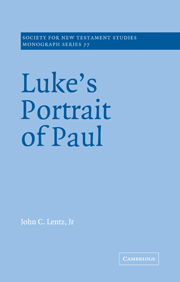6 - Paul's “appeal”
Published online by Cambridge University Press: 10 December 2009
Summary
The case against Paul seems straightforward as he comes before Festus. Luke reports that the Jews from Jerusalem have accused Paul of “many serious charges” (25:7). Luke, at this juncture, does not specify the charges although Paul, in verse 8, denies the unstated accusations that he has broken the law of the Jews, brought a non-Jew into the Temple, or preached against Caesar. That Paul had broken the law of Moses had been raised previously even by the Jewish Christians in Jerusalem (21:21). Furthermore, the allegation that Paul had brought a Gentile into the Temple led to the uproar by the Jews which, in turn, brought out the Roman soldiers who then arrested Paul (21:33). Although serious charges, breaking the religious laws of the Jews did not fall within the legal competence of the Roman authorities. This is clearly expressed by Gallio's response to the Jews of Corinth (18:14–15). The more serious charge against Paul, which would be of great interest to the Roman authorities, was the matter of riotous behavior caused by Paul's preaching and the potential for political rebellion. Paul is, after all, called a “pestilent fellow,” an “agitator” and a “ringleader of the sect of the Nazarenes” (24:5). Potential political insurrection and provincial unrest were causes of considerable concern to Rome, particularly in Judaea in the middle decades of the first century of the Common Era.
- Type
- Chapter
- Information
- Luke's Portrait of Paul , pp. 139 - 170Publisher: Cambridge University PressPrint publication year: 1993



